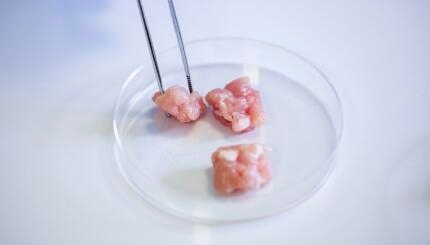I had been keeping kosher for two years before moving to Jackson, Mississippi. My reasoning for taking on the Jewish dietary laws was that every time I ate, a seemingly mundane and human activity, I was sure to be reminded of my Judaism.
However, there is debate these days about the humane or less-than-humane treatment of animals used for kosher meat and animal products. I am finally starting to realize that the treatment of the animals is important, because it not only affects them, but us as well—physically and psychologically. This idea of knowing where our food comes from and being aware that our food choices are ecologically sound is the main concept behind what is known as eco-kashrut.
I personally had never thought about eco-kashrut or how it could affect me, until recently, when I learned more about the eggs I was eating and from whence they came.
It’s important to mention that I eat a lot of eggs. Every other week I buy a dozen eggs and I hard boil eight to 10 of them, and then scramble or fry or use the others in recipes. For someone right out of college with a full-time job and a lot of travel, I love that they are versatile, delicious, healthy, and of course, cheap.
I always used to buy the cheapest eggs. Store brand, medium or large size, that was that. I didn’t bother with any of the organic, grain-fed, cage-free nonsense, I just wanted the cheapest eggs.
I didn’t think about the quality; they tasted fine to me. I certainly didn’t think about the chickens. That is, until I met a Jewish farmer in Jackson.
This farmer works on an educational farm for a boarding school in Mississippi. When he found out that I was eating these regular eggs pretty much every day, he was concerned.
I explained how I thought the “organic” and “cage free” and other special eggs I saw displayed didn’t mean anything at all. But he patiently explained the difference in the various types of eggs:
The worst kind of eggs to eat are the so-called regular ones – the ones I’d been eating. Those come from “commercially farmed” chickens stacked in cages on top of each other in dark enclosures, with clipped wings and beaks, who are never taken out of their cages.
Slightly better is cage-free. Although I learned that “cage free” chickens are still often raised in tight conditions with clipped beaks and wings, and little exposure to sunlight.
“Free range” means that the chickens have exposure to the outdoors.
Better still are certified organic free-range eggs, which ensures that the food given to the chickens is organic and that they aren’t given antibiotics, and the chickens have access to at least some outdoor space.
Finally, the best type of egg is “pasture raised.” This means that the chickens are free to roam, eat an organic diet, see daylight, are not given hormones or antibiotics, have darker and richer yolks, and generally taste better. May farmer’s markets or natural groceries carry these, and it’s definitely worth asking about. I am not on this step yet, but I hope to be in the next few weeks. But I’ve gone from regular eggs to cage-free eggs, which feels like a big leap in my eco-kashrut journey.
Living in Mississippi has opened my mind to the idea of eco-kashrut, and has also changed my perspective about the other food I eat aside from eggs. I participate in a weekly CSA (Community Supported Agriculture program) where I receive fresh, local vegetables every Tuesday.
Having a relationship with the farmers and knowing exactly where my food comes from has become very important to me. And after living in Jackson for almost a year, my idea of “kosher” has changed.
Depending on how strictly you observe the laws of kashrut, eggs do not necessarily have to be hechshered (certified kosher). If they come from a kosher animal such as a chicken, and you check to make sure there is no blood in the egg, then it is kosher.
But is the egg really kosher if it comes from a chicken that was raised in a tiny cage, stacked on top of other chickens, with clipped wings and beaks, never having seen sunlight… is that “kosher?” Does it reflect the Jewish value of tza’ar ba’alei chayim?
These are the questions I have started to ask myself recently, as I have become aware of the ecological issues surrounding the products I eat on a daily basis. I feel that my food and eating habits are even more “kosher” now that I live in Mississippi, and even if I do not always observe the traditional kashrut laws, I’m definitely thinking Jewishly about my food choices.
(Thanks to Jewish Initiatives for Animals for additional information on this piece; visit JIFA’s website to learn more about Jewish ethics and animals.)



